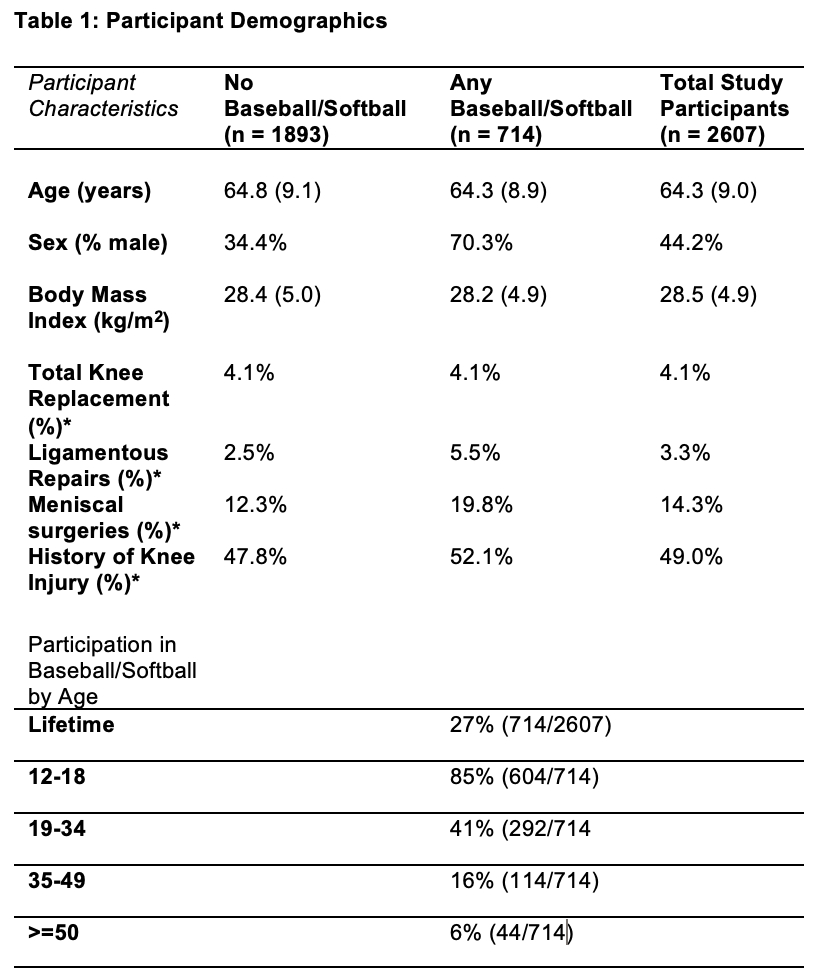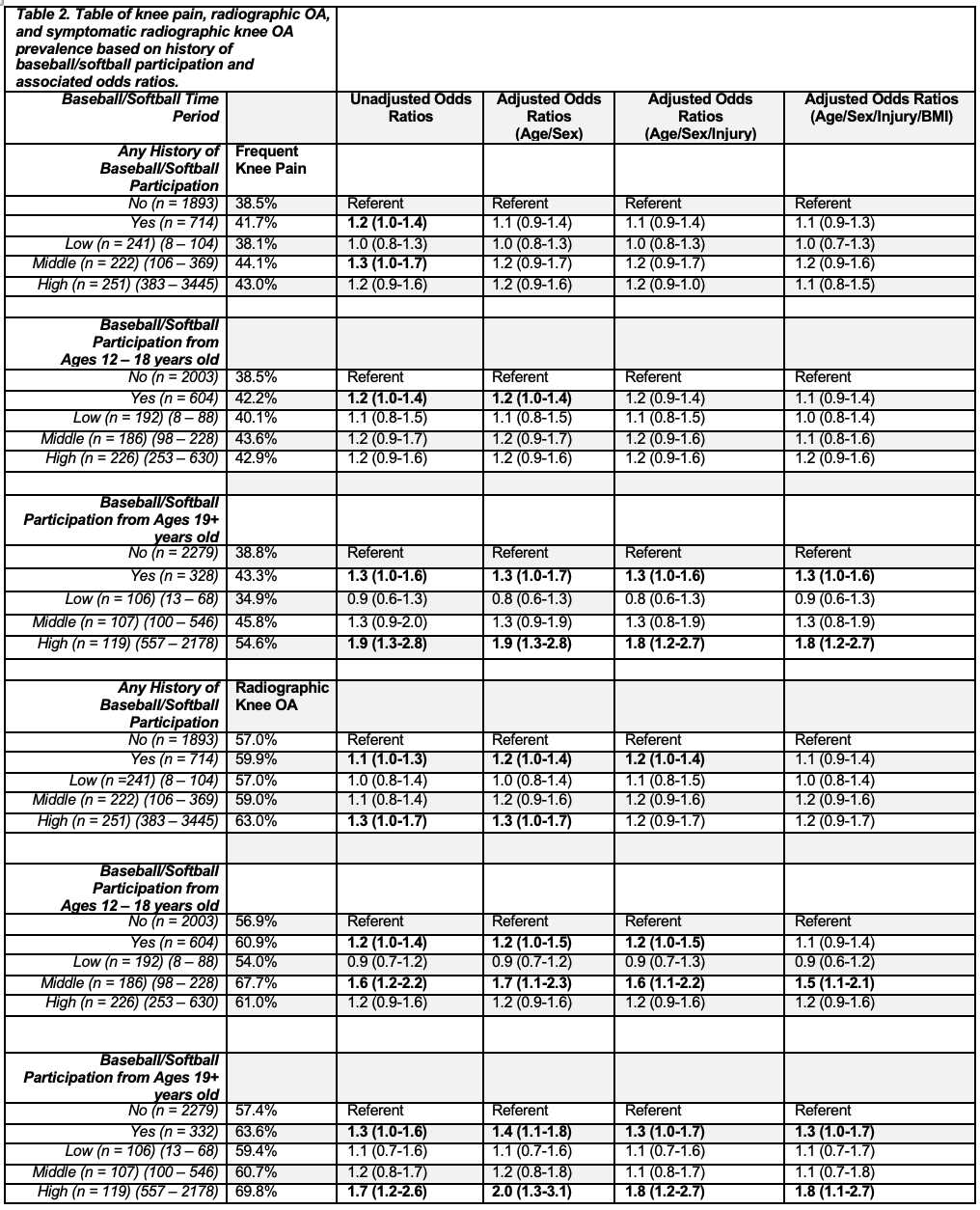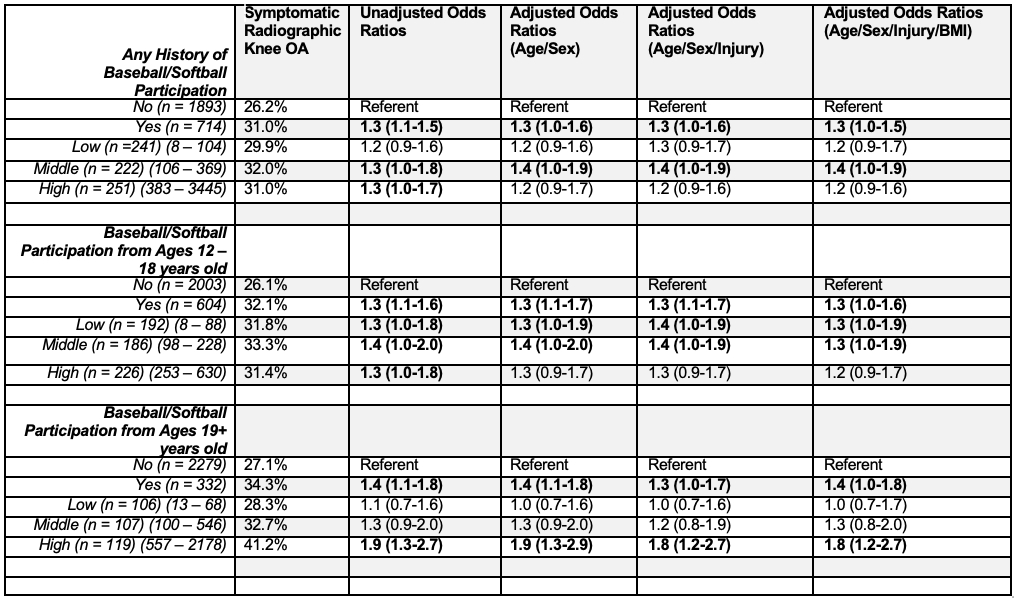Session Information
Date: Sunday, November 17, 2024
Title: Orthopedics, Low Back Pain, & Rehabilitation – ACR/ARP Poster
Session Type: Poster Session B
Session Time: 10:30AM-12:30PM
Background/Purpose: Baseball is often referred to as “America’s Pastime” and youth in the United States commonly participate in baseball and softball. With the increasing popularity of recreational leagues, little data informs whether participation is associated with knee pain or osteoarthritis (OA) later in life. We hypothesized that participation in baseball/softball would be associated with a higher prevalence of knee pain, radiographic knee OA, and symptomatic radiographic knee OA as an adult.
Methods: This is a retrospective cross-sectional study of Osteoarthritis Initiative (OAI) participants with knee x-ray readings, symptom assessments, and completed surveys on lifetime physical activity. Participants were asked to identify the top 3 most frequently performed physical activities (≥ 20 times in life) from ages 12 – 18, 19 – 34, 35 – 49 and >50 years old. Posterior-Anterior semi-flexed knee radiographs were scored for Kellgren-Lawrence (KL) grade (0-4).
Using logistical regression, we evaluated the association of any history of baseball/softball participation during 3 age periods: 12–18, 19+, and over the participant’s lifetime, with the prevalence of frequent knee pain, radiographic OA (ROA), and symptomatic radiographic OA (SOA) as outcomes. Outcomes were defined as: ROA with Kellgren and Lawrence > 2 in at least one knee, frequent knee pain was having recurrent knee pain in at least one knee. SOA was defined as having at least one knee with both ROA and frequent knee pain. We looked at exposure in two ways: (1) dichotomously (non-participants versus participants) and (2) 4 groups: non-participants and 3 levels of participation (low, medium, and high tertiles). The Cochran-Armitage trend test evaluated for a dose response. Analyses was unadjusted and adjusted for age, sex, BMI, and history of knee injury.
Results: Mean age was 64.3 (SD 9.0) years; BMI was 28.5 (SD 4.9) kg/m2. 27% (714/2607) played baseball/softball during their lifetime, 85% (604/714) during the 12-18 year-old age range, with 55% (394/714) playing at least 5 years during that age range. 41% (292/714), 16% (114/714), and 6% (44/714) identified baseball/softball as an activity during the 19-34, 35-49, and >50 year old age ranges respectively. 65% (395/604), 72% (209/292), 68% (78/114), 71% (31/44) participated at a competitive level during the 4 age ranges. Among those who played baseball/softball, 70.3% were men. Those who played baseball/softball had a higher percentage of ligamentous repairs, meniscal surgeries and prior history of injury (table 1).
Conclusion: This is the first large epidemiologic study to evaluate the association between baseball/softball participation and knee health. The majority of participation occurred as a youth, but 10% of the population played after age 18. For the individual outcomes, the association of baseball/softball participation as a youth with later knee pain and ROA is weak. However, age 19+ participation is associated with all three outcomes and is dose-dependent. This population may be particularly vulnerable to SOA. Prospective studies evaluating baseball/softball players are warranted, particularly those who play at a non-elite level over the age of 18.
To cite this abstract in AMA style:
Boldt C, Driban J, McAlindon T, Kriska A, Rockette-Wagner B, Eaton C, Hochberg M, Kwoh K, Nevitt M, Lo G. Participation in Baseball/Softball Associates with Increased Risk for Knee Pain and Osteoarthritis as an Adult: Data from the Osteoarthritis Initiative [abstract]. Arthritis Rheumatol. 2024; 76 (suppl 9). https://acrabstracts.org/abstract/participation-in-baseball-softball-associates-with-increased-risk-for-knee-pain-and-osteoarthritis-as-an-adult-data-from-the-osteoarthritis-initiative/. Accessed .« Back to ACR Convergence 2024
ACR Meeting Abstracts - https://acrabstracts.org/abstract/participation-in-baseball-softball-associates-with-increased-risk-for-knee-pain-and-osteoarthritis-as-an-adult-data-from-the-osteoarthritis-initiative/



